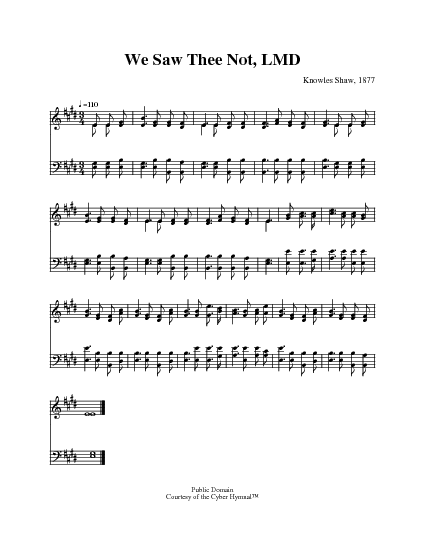Go Ad-Free
If you regularly use Hymnary.org, you might benefit from eliminating ads. Consider buying a Hymnary Pro subscription.
If you regularly use Hymnary.org, you might benefit from eliminating ads. Consider buying a Hymnary Pro subscription.

1 We saw Thee not when Thou didst come
To this poor world of sin and death;
Nor yet beheld Thy cottage home,
In that despised Nazareth;
Refrain:
But we believe Thy footsteps trod
Its streets and plains, Thou Son of God:
But we believe Thy footsteps trod
Its streets and plains, Thou Son of God.
2 We saw Thee not when lifted high
Amid that wild and savage crew;
Nor heard we that imploring cry,
"Forgive, they know not what they do!"
Refrain:
But we believe the deed was done,
That shook the earth and veiled the sun;
But we believe the deed was done,
That shook the earth and veiled the sun;
3 We gazed not in the open tomb,
Where once Thy mangled body lay;
Nor saw Thee in that "upper room,"
Nor met Thee on the open way;
Refrain:
But we believe that angels said,
"Why seek the living with the dead?"
But we believe that angels said,
"Why seek the living with the dead?"
4 We walked not with the chosen few,
Who saw Thee from the earth ascend;
Who raised to heav'n their wond'ring view,
Then low to earth all prostrate bend;
Refrain:
But we believe that human eyes
Beheld that journey to the skies;
But we believe that human eyes
Beheld that journey to the skies.
Source: Christian Hymns: for every purpose in worship #201
| First Line: | We saw Thee not when Thou didst come |
| Title: | We Believe |
| Author: | Anne R. Richter (1834) |
| Meter: | 8.8.8.8.8.8 |
| Language: | English |
| Copyright: | Public Domain |


 My Starred Hymns
My Starred Hymns